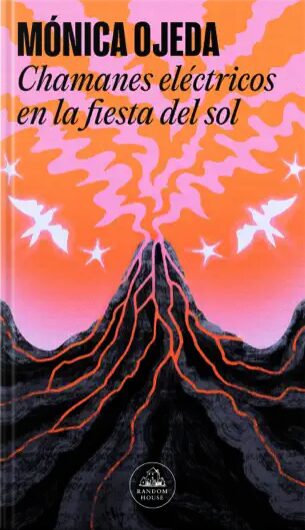Bogotá: Random House, 2024. 287 pages.
 When walking down a dark path, dark truths seek the light.
When walking down a dark path, dark truths seek the light.
In Chamanes eléctricos en la fiesta del sol, Ecuadorian author Mónica Ojeda—one of the greatest contemporary voices of Latin America and a bold explorer of the Andean Gothic genre—drags us through an inevitable displacement of bodies moving to different rhythms of violence imposed by nature and humanity.
Two friends, Nicole and Noa, embark on a journey to the macrofestival Ruido Solar at the maw of an active volcano, driven by a desperate need to find a place to belong—or, at the very least, a space where they can close their eyes, listen to the music, and cease seeing omniscient death. A place of physical and spiritual resistance.
In a land where fear reigns as a tyrant, shaped by a geographical context impregnated with cruelty, the characters attempt to escape the inescapable: God is everywhere, but so is Death. The narco-government leaves towns filled with corpses lying on the streets, the earthquakes make the earth’s heart beat—a Mother Earth that loves the living and the dead alike—and the active volcanoes foretell a future that threatens to take everything, even from those who have nothing.
Here, life is on edge, and at that edge, mysticism makes more sense than reason.
They are thrust into the primal instincts of their bodies to listen through music to the rot of their soul, to silence death, but, above all, to grasp the Wayra with their bare hands. They dance to the heartbeat of Mother Nature, embodying the destructive fury of Kali. Mónica portrays existence as womb and tomb, a constant revindication of life through death.
The chapters immerse us in the Andean calendar, placing us in a different kind of time—one ruled by our connection to our ancestors, our roots, and the rituals of the Andean mountain range.
On the way to the festival, we are introduced to the cacophony of voices that will lend their perspectives to the reader, completing the puzzle of a shared but dissonant experience. Internal and external dialogues intertwine, flowing into the psychedelic and physical journey, contradicting each other in the complexity of altered realities. Although each chapter follows the first-person voice of a different character, constructing the imagery of the festival of the sun, the author’s choice to forgo traditional dialogue and instead embed character interventions within the paragraph creates a disorienting effect. This noise contributes to a sense of unease, not only shaped by drugs but also by trauma, placing us firmly in the chaotic pulse of “El Ruido Solar.”
“Here, life is on edge, and at that edge, mysticism makes more sense than reason.”
Once at the heart of the festival, among all the beings and creatures of indigenous and urban folklore, we come to understand that this is only the first part of the journey toward the very human need to find a home—one that does not constantly crumble at the hands of God or man. From this longing is born the desire to seek Noa’s father, a father like many in Latin America, who procures his own destiny away from his family.
“In the beginning was the Word, and the Word was with the Father, and the Word was the Father.”
But in that reunion, Noa’s father fails to be both word and father. A man who finds his truth in the solitude and silence of the hunt and the forest. Though we hear him mostly through his writing, it is in his silence that we perceive the absence that accompanies him, the words that, if spoken, would confirm an abandonment too deliberate to be undone.
In the end, the characters are once again thrown into what seems an endless search for refuge.
“Everyone moves by their own weight” (“Cada quien se mueve con el peso de lo suyo”).
Ojeda presents a work that demands surrendering to its disorienting rhythms. The body becomes the medium through which to experience violence, death, music, and life. But it is words that create sound and shape the meaning behind those experiences. The book remains an open puzzle, with pieces that may seem missing to those who do not know how to contemplate the divinity of silence. Not the unspoken, but sacred silence.





